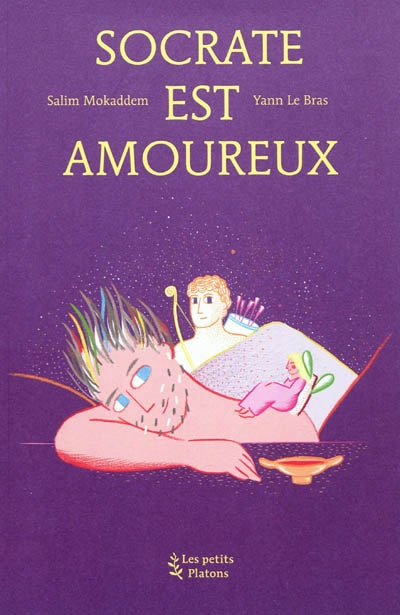Title of the work
Country of the First Edition
Country/countries of popularity
Original Language
First Edition Date
First Edition Details
Salim Mokaddem, Socrate est amoureux. Paris: Les petits Platons, 2011, 64 pp.
ISBN
Official Website
The book’s page on the official website of the publishing house (Accessed: November 5, 2021).
Available Onllne
Available for purchase on the official website of the publishing house (Accessed: November 5, 2021).
Genre
Adaptation of classical texts*
Adaptations
Fiction
Illustrated works
Philosophical fiction
Short stories
Target Audience
Crossover
Cover

Courtesy of the Publisher.
Author of the Entry:
Angelina Gerus, University of Warsaw, angelina.gerus@gmail.com
Peer-reviewer of the Entry:
Katarzyna Marciniak, University of Warsaw, kamar@al.uw.edu.pl
Elżbieta Olechowska, University of Warsaw, elzbieta.olechowska@gmail.com

Yann Le Bras (Illustrator)
Yann Le Bras is an illustrator based in Strasbourg, France. He studied visual arts at Rennes II University. He now works as an illustrator with the educational department of the Tomi Ungerer Museum. The first book illustrated by Yann Le Bras was La Mort du Divin Socrate (The Death of Divine Socrates, 2010). Among his later works are Le roi Midas et ses oreilles d’âne (Midas the King and His Donkey Ears, 2012), Socrate sort de l’Ombre (Socrates steps out of the Shadow, 2012), and Socrate Président ! (Socrates the President !, 2017).
Source:
Official website (accessed: December 2, 2021).
lespetitsplatons.com (accessed: December 2, 2021).
Bio prepared by Sonya Nevin, University of Roehampton, sonya.nevin@roehampton.ac.uk and Angelina Gerus, University of Warsaw, angelina.gerus@gmail.com

Courtesy of the Author.
Salim Mokaddem
, b. 19..
(Author)
Salim Mokaddem is a contemporary French philosopher, writer, professor agrégé in philosophy, and former Presidential adviser of Niger. Having received his PhD and agrégation at the University Paris 1 Panthéon Sorbonne, from 1995 to the present, he teaches philosophy at the University of Montpellier. He has a major interest inter alia in the history of philosophy (from antiquity to modern times), the philosophy and anthropology of education and childhood, in post-humanism et trans-humanism. His book for children Socrate est amoureux (Socrates in Love), an adaptation of Plato’s Symposium, issued in 2011 by “Les Petits Platons” publishing house, was translated into 10 languages.
Sources:
linkedin.com profile (Accessed: November 5, 2021).
editions-harmattan.fr (Accessed: November 5, 2021).
lirdef.edu.umontpellier.fr (Accessed: November 2, 2021).
ORCID profile (Accessed: November 5, 2021).
Bio prepared by Angelina Gerus, University of Warsaw, angelina.gerus@gmail.com
Translation
Turkish: Sokrates'in Aşkı, trans. Haldun Bayrı, İstanbul: Metis Yayınları, 2012, 64 pp.
Spanish: Sócrates está enamorado, trans. Gemma Rovira Ortega, Bogotá: Editorial Panamericana, 2014, 64 pp.
Russian: Влюблённый Сократ [Vlyublyonnyj Sokrat], trans. Aleksandra Sokolinskaya, Moskva: Ad Marginem, 2016, 64 pp.
Albanian: Sokrati i dashuruar, trans. Saverina Pasho, Tiranë: Papirus, 2017, 64 pp.
Summary
Socrates heads to Agathon’s banquet on the occasion of the poet’s victory in the city’s competition. The guests eagerly await his arrival and begin a discussion on Eros, the god of Love. The artist Phaedrus calls him the oldest of the gods and notes that he inspires lovers to show courage, for example, on the battlefield, since nothing could shame more than to be seen as a coward in the eyes of a beloved one. The writer Pausanias specifies that there are two Erotes and two Aphrodites, which means that there are two kinds of love: terrestrial (sensual) and heavenly. Then, in contrast to Plato’s dialogue, Agathon speaks, he describes this god as the most tender, awakening feelings in the hearts of mortals and gods alike and transforming a lover into a poet. After the applause, Eryximachus, the doctor, takes the floor, pointing out that love is a universal law and that Eros himself combines opposite characteristics – discord and harmony, need and prosperity. Comediographer Aristophanes recounts the Myth of the Androgynous, whereby love is understood to be the search for one’s missing half and the happy reunion of these two pieces. After a short discussion, Socrates begins his speech, retelling the teaching of the priestess Diotima about the Ladder of Love, which is also a teaching about Beauty. Then, in a moment of common tension, Alcibiades appears, praising the philosopher so much that he seems akin to the god Eros. The feast continues, and before going home, Socrates confesses that the object of his love, which gives meaning to life, is no other than philosophy. A new day begins.
Analysis
Based on a presentation by Angelina Gerus “Socrates in Love”: How to Introduce Plato to the Youngest on the conference “Our Mythical History: Children’s and Young Adults’ Culture in Response to the Heritage of Ancient Greece and Rome” (May 22–26, 2019; Warsaw, Poland). Summary in the conference booklet is available online at omc.obta.al.uw.edu.pl (Accessed: November 5, 2021).
Socrate est amoureux (Eng. Socrates in Love) by Salim Mokkadem is an adaptation of Plato’s Symposium entertainingly recounted for young readers. It may serve as a primer engaging a child into philosophy and Platonic theory of Forms in particular. Moreover, regarding philosophy, the story brings to light the themes of love and sexuality, truth and wisdom, which are of great importance to young audiences.
The title shifts the focus from the banquet and its participants to Socrates and his mysterious object of love. Therefore, the philosopher’s superiority over the others is emphasised clearly: he is expected to be the main character, whose figure is crucial for the storyline, and he is supposed to guide readers through the text.
Although the device enriches the story with explanations and comments, the omniscient narrator is not involved in the plot. Moreover, Plato’s prologue is eliminated so that the text is no longer the story of Aristodemus being recounted by Apollodorus to his friend Glaucon. At the same time, all the discourses of Plato’s Symposium (those of Phaedrus, Pausanias, Agathon, Eryximachus, Aristophanes, Socrates and Alcibiades) are present in Mokaddem’s book, however, slightly reordered. Thereby it deprives itself of the philosophical significance of the original form (since each speech stands as a link in a chain of the concept of love, from its lowest to its highest level). As a result, such a series of orations, typical for the symposium as a prose genre in classical literature, is transformed into a short story with many dialogues.
The figure of Socrates, who is a protagonist of the book, dominates both verbal and visual narration (as the book is generous with illustrations). The story begins straight from the moment when the philosopher, “shaved, perfumed and wearing fancy slippers” (p. 7), heads to the banquet held by Agathon. This character also enables a chiastic compositional structure: as the text starts with his arrival, it ends when he’s gone in the morning. Socrates is represented as a vivid, historical person more than it was in Plato’s texts. This aspect is re-enforced not only by indicating the years of birth and death of the thinker placed on the front flip of the jacket and followed by a short anecdote by Diogenes Laertius (cf. D. L. II.5.36-37), but also by a remark of Aristophanes in the text itself. Interrupting Socrates’ speech to compare his parents to the ones of Eros, the comic playwright stresses their resemblance, in this manner providing readers with some additional information from the philosopher’s bio. In the children’s book, biographical elements aim to show Socrates in a more realistic way that should bring him closer to the young reader.
Like in the Greek text, Socrates turns to be an intermediary for Plato’s ideas, albeit to a lesser extent than in the dialogue. In simple terms, the famous Ladder of Love, referring to the mantineian prophetess Diotima, is set out explicitly: as a gradual progression up the ladder from love to the body, through love to all the beautiful bodies, through love to the soul, finally through love to Beauty. Τhus, the speech of Socrates can also be considered an argument in favor of the doctrine of Forms. Although in this very book there is no purpose in introducing Plato’s ontology to children in its entirety (since, for example, the Allegory of the Cave or the theory of soul are represented in another publication within “Les Petits Platons” series), it makes readers gain the knowledge and experience from interaction with the text and absorb the codes that will facilitate one’s further access to Plato’s doctrine and philosophy as a whole.
Besides being a stepping-stone to Plato’s philosophy, the short story stands as a tribute to Socrates. The character is thoughtful, virtuous, ironic, more attractive and interesting than others; as Roland Barthes notes in “A Lover's Discourse”, Socrates is atopos – atypical and unclassifiable in the eyes of a subject in love. Everybody, including a reader, eagerly looks forward to his arrival at Agathon’s, to his speech as a culmination point. In the book, Socartes behaves in an emotive way: he comments on the discourses, smiles, laughs, raises his eyes to the heavens, shakes his head or expresses his delight listening to the interlocutors, which push the reader to reflection.
Mokaddem’s book demonstrates distinctly and precisely both the ideas of Plato and the Socratic method, maieutics. The story itself ends on a truly Socratic note: “Life without love turns into suffering. Life without philosophy is lacking in the very substance. Yes, I’m in love. I love philosophy, as philosophy is the love to the genuine life” (p. 61). The Socrates’s figure continues its guidance further through other books of the series issued by “Les Petits Platons” publishing house, in the books La Mort du divin Socrate (The Death of Socrates, 2010) by Jean Paul Mongin, Socrate sort de l’Ombre (Socrates comes out of the Shadows, 2012) and Socrate Président ! (Socrates for President!, 2017) by Yan Marchand.
Further Reading
Chiesa, Lorenzo, “Le Ressort de l’Amour: Lacan’s theory of love in his reading of Plato’s Symposium”, Angelaki 11 (2006): 61–81.
Lesher, James, Debra Nails et al., eds., Plato's Symposium: Issues in Interpretation and Reception, Cambridge: Harvard University Press, 2006.
Plato, Lysis. Symposium. Gorgias, trans. W. R. M. Lamb, Loeb Classical Library 166, Cambridge: Harvard University Press, 1925.
Strauss, Leo, On Plato's Symposium, Chicago: University of Chicago Press, 2001.
Addenda
This short story, issued by the French publishing house “Les Petits Platons” [The Tiny Platos], is part of the series adapting philosophical texts and ideas of all time for children and teenagers. Written in French, these books now are actively spreading worldwide, translated already into eleven languages. Along with Socrate est amoureux, the series presents various other books retelling classic philosophical texts or referring to ancient philosophy in another way.
Official website of the publishing house (Accessed: November 5, 2021).
Symposium facts for kids in Kids Encyclopedia Facts, available online at kids.kiddle.co (Accessed: November 5, 2021).


